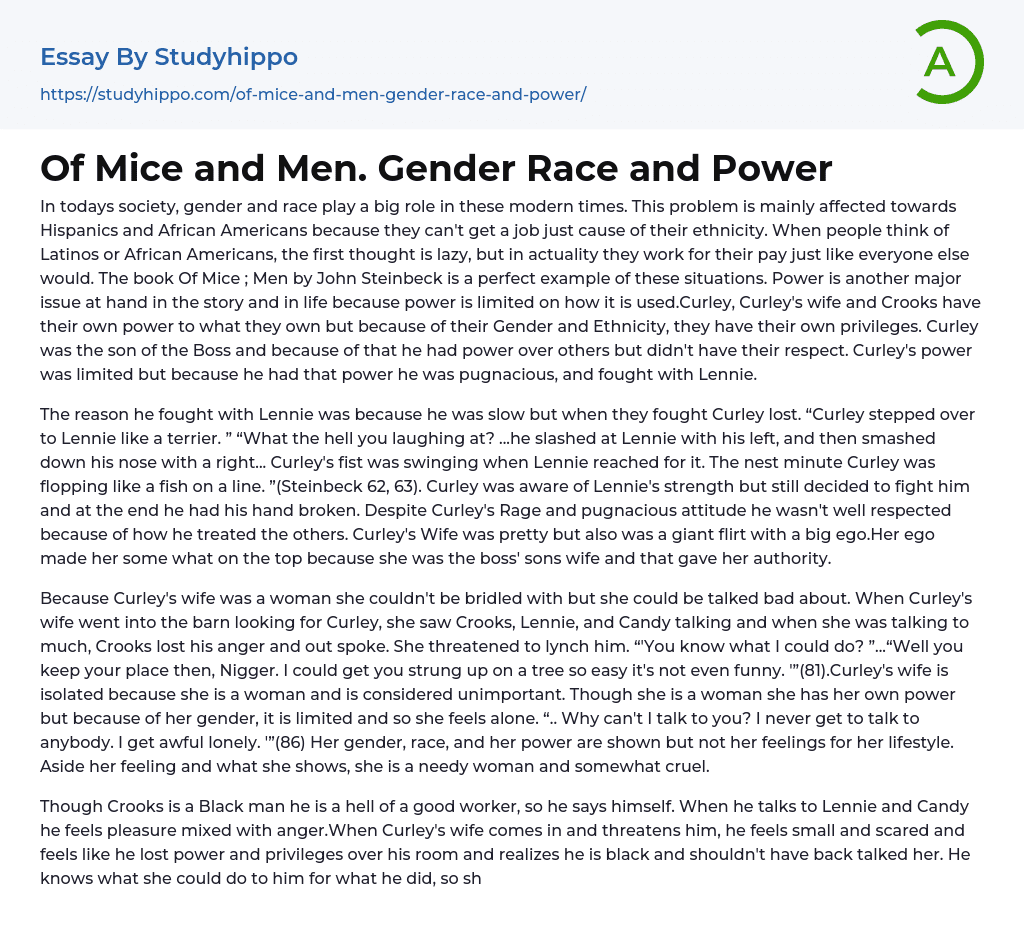In today's society, gender and race have a significant impact, particularly on Hispanics and African Americans who often encounter employment discrimination based on their ethnicity. Regrettably, stereotypes of laziness are associated with Latinos and African Americans despite their equal work ethic. John Steinbeck's book Of Mice & Men illustrates these situations. Power is also a prominent issue both in the story and in reality as it is limited in its usage. Characters like Curley, Curley's wife, and Crooks possess power and possessions of their own; however, their gender and ethnicity restrict them from enjoying the same privileges as others.
Curley, the son of the Boss, held power over others but lacked their respect, leading to his pugnacious nature. Despite his limited power, he instigated a fight with Lennie, who he
...perceived as being slow. However, Curley ended up losing the fight. As described in the book, "Curley stepped over to Lennie like a terrier. 'What the hell you laughing at?' ... he slashed at Lennie with his left, and then smashed down his nose with a right..."
Curley's fist was swinging when Lennie reached for it. The nest minute, Curley was flopping like a fish on a line. ”(Steinbeck 62, 63). Despite being aware of Lennie's strength, Curley still decided to fight him and ended up with a broken hand. However, Curley's rage and pugnacious attitude did not earn him respect from others. Although Curley's Wife was pretty, she was also a giant flirt with a big ego. Her ego placed her somewhat on the top because she was the boss' son's wife, which gave her authority.
Due to being a woman, Curley's wife was not allowed to
be controlled but she was subject to gossip. While searching for Curley in the barn, she encountered Crooks, Lennie, and Candy engaged in conversation. As she continued to talk excessively, Crooks became increasingly furious and confronted her. In response, she threatened to hang him. "Do you know what I could do?" ... "Well, you better stay in your place, Nigger."
Due to her gender, Curley's wife is marginalized and experiences feelings of isolation and insignificance. Despite possessing personal power, societal expectations restrict it, resulting in her feeling alone. To convey her loneliness, she expresses the desire to talk to someone, expressing, "Why can't I talk to you? I never get to talk to anybody. I get extremely lonely." (86) Although her gender, race, and power are evident, the emotional connection she has with her lifestyle is not emphasized.
Despite her displayed emotions, she is an insecure and somewhat callous woman. Although Crooks, being a Black man, acknowledges himself as an exceptional worker. When conversing with Lennie and Candy, he experiences a mixture of pleasure and anger. The entrance of Curley's wife instills feelings of inferiority and fear in him, causing him to realize that he has lost authority and privileges over his own room because of his race and his past defiance towards her. He is aware of the potential consequences for his actions, as she reminds him by saying, "You know what I could do?". She further asserts her dominance by commanding him to "keep your place then...."
I could easily get you strung up, and trust me, it's not a funny matter. This statement (80, 81) exemplifies the power dynamics at play between a white
female and the boss' son's wife. As a result, he felt isolated and alone, realizing the harsh reality of how white people can be cruel. This realization occurred as he grew older, shaped by his living conditions and the way he was treated. He expressed his plight by saying, "Why aren't you wanted?... Because I'm black. They play cards in there, but I'm unable to join due to my race..." (68).
This passage highlights the discrimination faced by black individuals, such as Crooks, who were excluded from numerous activities due to their race. Despite being detached from others, Crooks was a good person who had insecurities and worked hard. Today, gender, race, and power remain prominent factors in economic and political spheres. Some argue that women are unfit for governing a country, while African Americans and Latinos often struggle to find well-paying jobs due to their identity. In the novel, isolation was a common experience for characters like Curley's wife and Crooks.
Curley and his Wife, although they faced cockiness and loneliness, possessed more privileges than others on the ranch. However, their authority resulted in a lack of respect from their peers.
- Social Construction of Gender essays
- Boy essays
- Gay essays
- Gender essays
- Gender Identity essays
- Gender Roles In Society essays
- Gender Stereotypes essays
- Girl essays
- Homosexuality essays
- Human Sexual Behavior essays
- Lgbt essays
- Man essays
- Masculinity essays
- Sexual Orientation essays
- Transgender essays
- Woman essays
- 1984 essays
- A Farewell to Arms essays
- A Good Man Is Hard to Find essays
- A Hanging essays
- A Lesson Before Dying essays
- A Long Way Gone essays
- A Rose For Emily essays
- A Separate Peace essays
- A Tale Of Two Cities essays
- A Very Old Man With Enormous Wings essays
- Adventures Of Huckleberry Finn essays
- Alice in Wonderland essays
- All Quiet on The Western Front essays
- Allegory of the Cave essays
- An occurrence at owl creek bridge essays
- Animal Farm essays
- Anthem essays
- Antigone essays
- Arthur Conan Doyle essays
- As I Lay Dying essays
- Atticus Finch essays
- Barn Burning essays
- Battle Royal essays
- Beauty and The Beast essays
- Beloved essays
- Boo Radley essays
- Brave New World essays
- Candide essays
- Castle essays
- Characters In Hamlet essays
- Characters In Romeo And Juliet essays
- Christmas carol essays
- Chronicle of a Death Foretold essays
- Cinderella essays




